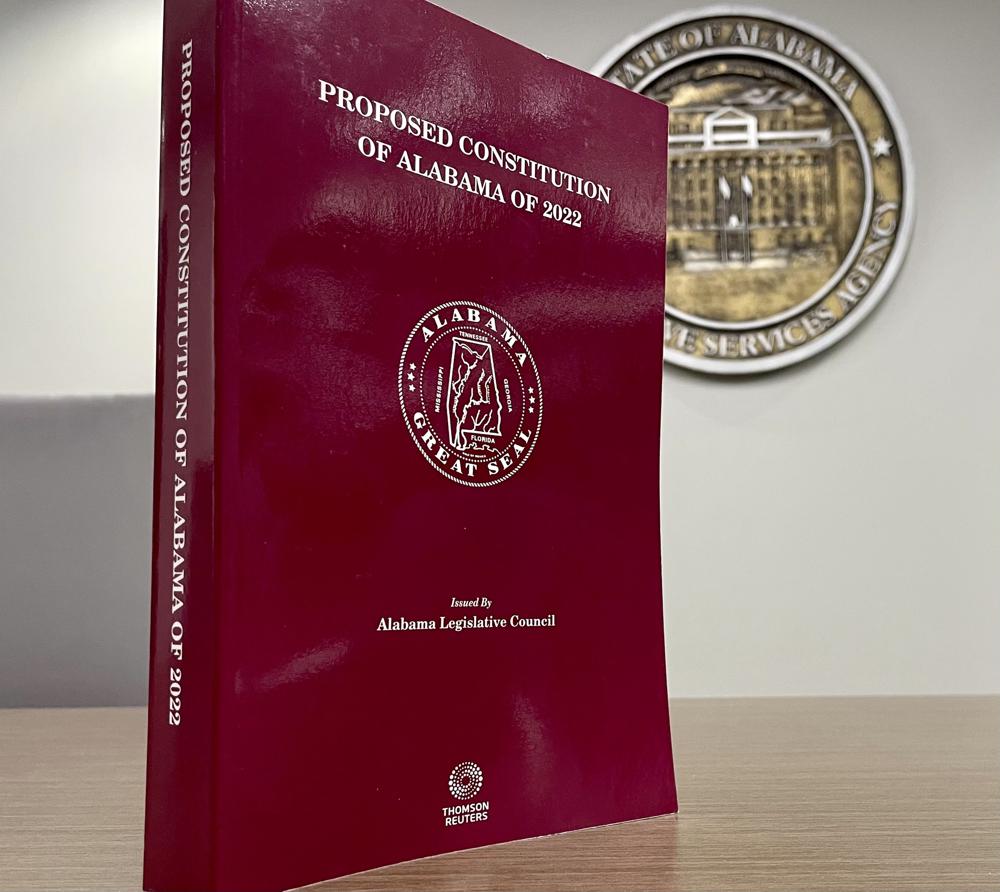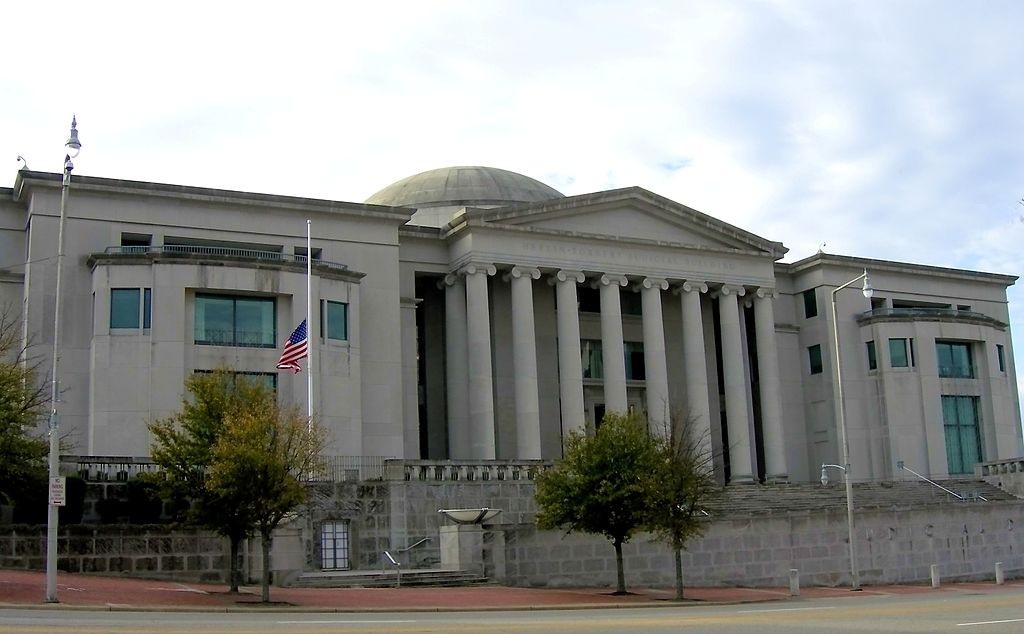Steve Marshall announces a three-count capital murder indictment of Ibraheem Yazeed for the slaying of Aniah Blanchard

Attorney General Steve Marshall announced the indictment of Ibraheem Yazeed on three counts of capital murder for the death of Aniah Haley Blanchard. Blanchard was a college student studying at Southern Union. Aniah was reported missing in Auburn on October 24, 2019, and her body was discovered on November 25, 2019, in a wooded area in Macon County. Yazeed, age 32, of Montgomery, was served the indictment Tuesday in the Lee County jail, where he is currently being held without bond. Attorney General Marshall’s office presented evidence to a Macon County grand jury on November 4, 2022, resulting in Yazeed’s indictment on three counts of capital murder on Monday. The indictment charges Yazeed with one count of capital murder during a kidnapping in the first degree, one count of capital murder during robbery in the first degree, and one count of capital murder involving a victim in a vehicle. The indictment charges Yazeed with intentionally causing the death of Blanchard by shooting her with a gun during the course of abducting her and robbing her of a vehicle and cell phone. The indictment also charges Yazeed intentionally caused Blanchard’s death while she was inside her vehicle, a 2017 Honda CR-V. If convicted, Yazeed could face the death penalty or a sentence of life imprisonment without parole for each of the three charges of capital murder. Yazeed had already been charged with kidnapping, attempted murder, and robbery but was out on bond awaiting trial when he allegedly abducted and murdered Blanchard. Authorities allege that Blanchard was not the first person that Yazeed has murdered. Due to the horrible crime, the voters of Alabama recently ratified a constitutional amendment allowing district attorneys to request that judges deny bail for dangerous villains. Marshall campaigned hard for the ratification of Amendment One – which was named Aniah’s Law in memory of Blanchard. The Blanchard family was instrumental in the campaign to pass the Amendment to the Alabama Constitution of 1901. The case is being prosecuted by Attorney General Marshall’s Criminal Trials Division. Marshall thanked local and state law enforcement agencies, especially the Auburn Police Department, Montgomery Police Department, the Alabama Law Enforcement Agency, the Federal Bureau of Investigation, and the Lee and Macon County Sheriff’s Offices, for their expert work in investigating this case, as well as both the Lee and Macon County District Attorneys’ Offices. Yazeed has merely been indicted. He will still have his day in court and the opportunity to present a defense. Under the American justice system, everyone is assumed to be innocent until proven guilty before a jury of their peers. To connect with the author of this story, or to comment, email brandonmreporter@gmail.com.
Alabama Big 10 Mayors say state will be safer thanks to Aniah’s Law

On Tuesday, Alabama voters went to the polls and overwhelmingly voted to ratify Amendment One -Aniah’s Law. The Big 10 Mayors had endorsed ratification of the bill to allow judges to deny mail to dangerous felons. After Tuesday’s victory, the Mayors said they will continue to collectively advocate for policy goals that make the state a better place for all Alabamians “We were proud to support this constitutional amendment and to have fought for its approval by Alabama voters,” the Mayors said. “This is a big win for public safety in Alabama and will honor Aniah’s memory for generations to come.” They thanked voters for making Alabama safer by showing up at the polls and voting for Aniah’s Law. “As mayors of Alabama’s ten largest cities, we understand the great responsibility we have to promote public safety in our communities,” the Mayors said. Early on, we identified Aniah’s Law as an issue in which we could use our collective influence to advocate for and make Alabamians safer. This amendment will give Alabama judges and District Attorneys the tools they need to keep violent criminals off the streets.” Under current Alabama law, judges have limited authority to deny bail to violent offenders unless the suspect is charged with a capital offense or poses a flight risk. Proponents say that means that dangerous criminals are often released back onto the streets, even when it is likely they will commit more violent crimes as soon as they make bail. Aniah Blanchard was a Southern Union student who was kidnapped off of the streets of Auburn at a gas station by a known violent kidnapper who was out on bond. She was brutalized, raped, and murdered by her attacker. Her parents were instrumental in Aniah’s law being passed by the Alabama Legislature. Now, after a majority of Alabama voters voted to pass Aniah’s Law, judges will be able to deny bail to dangerous offenders who are likely to re-offend when charged with serious felonies like murder, kidnapping, rape, sexual torture, domestic violence, human trafficking, burglary, arson, robbery, terrorism, or aggravated child abuse. “Far too often, these offenders – who are often charged with crimes such as murder, rape, and kidnapping – are released to re-commit more heinous crimes while they await trial. That flawed system led to the kidnapping and murder of 19-year-old Aniah Blanchard in October of 2019. Simply put, Aniah’s accused killer should have been in jail, and Aniah should still be alive. We were honored to help get this constitutional amendment across the finish line to protect Alabamians from suffering the same tragedy that befell Aniah and her family. We were proud to support this constitutional amendment and to have fought for its approval by Alabama voters. This is a big win for public safety in Alabama and will honor Aniah’s memory for generations to come.” Amendment one was also endorsed by Gov. Kay Ivey, Attorney General Steve Marshall, Secretary of State John Merrill, and unanimous votes by both Houses of the Alabama Legislature, where it was sponsored by State Rep. Chip Brown. “We will continue to collectively advocate for policy goals that make our state a better place for all Alabamians,” said the Mayors. The Alabama Big 10 Mayors include Auburn Mayor Ron Anders, Birmingham Mayor Randall Woodfin, Decatur Mayor Tab Bowling, Dothan Mayor Mark Saliba, Hoover Mayor Frank Brocato, Huntsville Mayor Tommy Battle, Madison Mayor Paul Finley, Mobile Mayor Sandy Stimpson, Montgomery Mayor Steven Reed, and Tuscaloosa Mayor Walt Maddox. All ten statewide constitutional amendments and the 2022 recompiled state constitution were ratified by voters on Tuesday. To connect with the author of this story, or to comment, email brandonmreporter@gmail.com.
Election 2022: A comprehensive guide to the Alabama Constitutional Amendments

Tomorrow, unlike swing states like Georgia, Pennsylvania, and Arizona, it’s safe to say that the results of all statewide offices will be a foregone conclusion in Alabama. Alabama Daily News polling, released last week confirmed that republican candidates were favored in the state with 62.4 favorability. (Polling that was subsequently ripped off by AL.Com, who reproduced it in its entirety, without permission from behind the ADN Inside Alabama Politics paywall.) According to Secretary of State John Merrill as many as 45-50% of eligible voters are expected to turn out. In addition to statewide offices and legislative races, there will also be a vote on a new recompiled Constitution and ten new constitutional amendments. Here’s a brief look at those constitutional changes on the ballot with summaries from the Associated Press, The Alabama Policy Institute (API), and other sources. If you’re looking to verify your polling place or are looking for sample ballots you can visit AlabamaVotes.gov for you can also find the Fair Election Commission detailed summaries of at this link on the Secretary of State website. Ratification of the Constitution of Alabama of 2022 The Fair Ballot Commission describes this saying, “The Constitution of Alabama of 2022 will only do the following: (1) rearrange the constitution so that similar subjects are located together; (2) remove racist language; (3) delete repeated or repealed portions/language; (4) place all amendments which deal with economic development together; and (5) arrange local amendments by county. The reorganized constitution will make no changes other than those listed above and will not make any changes relating to taxes.” The recompiled document deletes racist language and repealed provisions. It also reorganizes the sprawling document and makes it more user-friendly. The Alabama 1901 Constitution is the longest constitution in the country. This ratification comes Amendment One: The Fair Ballot Commission describes this by saying, “This amendment will change Section 16 to add crimes for which bail can be denied, to include murder, kidnapping in the first degree, rape in the first degree, sodomy in the first degree, sexual torture, domestic violence in the first degree, human trafficking in the first degree, burglary in the first degree, arson in the first degree, robbery in the first degree, terrorism, and aggravated child abuse of a child under the age of six.” Amendment one would create Aniah’s Law, which would limit bail for individuals accused of specified violent crimes. It is named after Aniah Blanchard, who was murdered by a man out on bond for attempted murder. API stated, “While the sentiment for ratifying the law is understandable, it does raise due process concerns for those accused, but not yet convicted, of crimes.” Governor Kay Ivey and Attorney General Steve Marshall urged voters to vote yes for Aniah’s law. Marshall stated, “Aniah’s Law—which you will find on your ballot as Amendment 1—amends the state constitution to allow judges the discretion to deny bond to violent criminals like Aniah’s murderer. So, on Tuesday, be sure to vote “yes” on Amendment 1, which will keep dangerous criminals off the street and the public out of harm’s way. And thank you to Aniah’s family for leading the charge to make Alabama a safer place.” Apryl Marie Fogel, Alabama Today’s publisher and host of Straight Talk with Apryl Marie on News Talk 93.1 FM, said, “Voting yes on Amendment 1 is a no-brainer! This amendment gives judges the ability to use their discretion to deny bail to those who have no business out on our streets. It doesn’t say they must stay in jail, but it says that a judge has the discretion to keep them there. Imagine being a victim or the loved one of a victim of a violent crime, knowing that the person responsible is back out on the street immediately. That’s unacceptable. One of the few responsibilities of government is to ensure public safety. That’s what this does and why we should pass it.” John Eidsmoe and Roy Moore expressed their concerns about the proposed law. “I feel terrible about what happened to Anaiah Blanchard,” Moore said. “But that is not a reason to go and change the constitution.” The Southern Poverty Law Center opposes this amendment telling AL.Com that it could lead to people who are not yet convicted of a crime “languishing in Alabama’s jails for years at a time.” Amendment Two: Amendment two would allow the state, county, and municipal governments to spend federal stimulus funding through grants for broadband infrastructure projects. The state has already allocated money for this purpose. API stated, “The primary concern with this amendment is that Alabama needs it for local governments to be able to spend the money for its authorized purpose in the first place. The state should not control the ability of local governments to spend already allocated money for its intended purpose.” Moore and Eidsmoe said that they are strongly opposed to both Amendments 2. Amendment three would require the Governor to notify the state Attorney General and a victim’s family before postponing or commuting a death sentence. Because then Governor Fob James was hesitant to execute a woman, in 1999, he commuted the death sentence of convicted murderer Judith Ann Neeley before he left office. The family of 13-year-old Lisa Millican, who was brutally raped and murdered by Mrs. Neeley and her husband, were outraged by Gov. James’ actions. This amendment is the Legislature’s response to that decision over twenty years ago. API has no concerns with this amendment. Amendment four to the constitution would require that any law impacting a general election be passed at least six months before the election. API stated, “A potential concern with this amendment is that it could limit the Legislature’s ability to make a necessary change to election law if unexpected circumstances arise less than six months before the next election. It comes down to a question of do you have faith in the government to use this power responsibly, or would you rather them not have the power at all?” Former state representative and current Jefferson County GOP Chairman Paul DeMarco urged voters to support this amendment,
Steve Marshall urges voters to vote Yes for Aniah’s Law

Attorney General Steve Marshall released a video statement on Monday expressing his strong support for Statewide Amendment 1, Aniah’s Law. Marshall asked the people of Alabama to vote to adopt the amendment when they vote on Tuesday. “On Election Day, several proposed amendments to the state constitution will be on the ballot,” Marshall said. “One is vital for public safety. That would be Amendment 1, which creates what is known as Aniah’s Law.” “As you will recall, Aniah Blanchard was the young woman who, in 2019, went missing and was later found murdered,” Marshall said. “The man charged with Aniah’s abduction and murder was out on bond at the time he committed his heinous acts, despite already being charged with multiple violent crimes, including kidnapping.” “Aniah’s case was a terrible tragedy that drew national attention, but I am here to tell you that hers is not the only case of this kind—and it won’t be the last,” said Marshall. “That’s why we need Aniah’s Law. Aniah’s Law—which you will find on your ballot as Amendment 1—amends the state constitution to allow judges the discretion to deny bond to violent criminals like Aniah’s murderer. So, on Tuesday, be sure to vote “yes” on Amendment 1, which will keep dangerous criminals off the street and the public out of harm’s way. And thank you to Aniah’s family for leading the charge to make Alabama a safer place.” Aniah’s Law has also been endorsed by Governor Kay Ivey. “It is past time we fix those issues, but because of the unwavering dedication of Aniah’s family and the unanimous support by the Alabama Legislature, Amendment One, also known as Aniah’s Law, will be on the ballot this November,” Ivey said. “I encourage every Alabamian to join me in voting yes on Aniah’s Law to ensure no family would have to go through the pain of preventable tragedy.” Under current Alabama law, judges have limited authority to deny bail to violent offenders unless the suspect is charged with a capital offense or poses a flight risk. That means that dangerous criminals are often released back onto the streets, even when it is likely they will commit more violent crimes as soon as they make bail. Proponents argue that if the majority of Alabamians vote for Aniah’s Law, then judges will be able to deny bail to dangerous offenders who are likely to re-offend when they are charged with serious felonies like murder, kidnapping, rape, sexual torture, domestic violence, human trafficking, burglary, arson, robbery, terrorism, or aggravated child abuse. This legislation was sponsored by State Rep. Chip Brown. It passed unanimously by the state legislature in April 2021 and was named in memory of murdered 19-year-old Southern Union Community College student Aniah Blanchard. Her accused murderer was out on bail awaiting trial for charges of kidnapping, attempted murder, and robbery. Amendment One has also been endorsed by the Mayors of Alabama’s ten largest cities. “As members of the Alabama Big 10 Mayors, public safety is one of our top priorities,” the Mayors wrote in a statement. “And on the November 8 ballot, there will be a constitutional amendment that, if voted for by a majority of Alabamians, would give our state’s judges the tools they need to keep violent, repeat offenders off our streets and out of our communities, and in jail where they belong. In October 2019, 19-year-old college student Aniah Blanchard was tragically kidnapped. The suspect in her case was out free on bond, awaiting trial for charges of attempted murder and armed robbery. He should have been incarcerated, and Aniah Blanchard should still be alive.” “We urge all Alabama voters to vote for Amendment One on election day so what happened to Aniah and her loved ones will not happen again,” the Big 10 Mayors concluded. The Alabama Big 10 Mayors include Auburn Mayor Ron Anders, Birmingham Mayor Randall Woodfin, Decatur Mayor Tab Bowling, Dothan Mayor Mark Saliba, Hoover Mayor Frank Brocato, Huntsville Mayor Tommy Battle, Madison Mayor Paul Finley, Mobile Mayor Sandy Stimpson, Montgomery Mayor Steven Reed, and Tuscaloosa Mayor Walt Maddox. Polls will open Tuesday at 7:00 am and close at 7:00 pm. Voters need to bring a valid photo ID to the polls with them in order to vote. To connect with the author of this story, or to comment, email brandonmreporter@gmail.com.
Alabama Constitution, 10 amendments on Nov. 8 ballot

Alabama voters on Nov. 8 will decide whether to strip racist language from the state constitution. They will also vote on 10 amendments. Here’s a brief look at what’s on the ballot: Ratification of the Constitution of Alabama of 2022: Voters will decide whether to ratify a recompiled Alabama Constitution. The recompiled document deletes racist language and repealed provisions. It also reorganizes the sprawling document. The changes are designed to remove the lingering stain of the state’s segregationist past and make the document more user-friendly. Amendment 1 – Bail restriction The measure is aimed at giving judges more discretion to deny bail to people charged with violent crimes. It adds murder, kidnapping, rape, and other offenses to the list of crimes for which bail can be denied. The measure is named Aniah’s Law after 19-year-old Aniah Blanchard, who was killed in 2019 after being abducted from an Auburn gas station. Amendment 2 – Broadband funding The amendment is part of the state’s effort to expand broadband access. It clarifies that local governments can grant federal funds or other state funding to a public or private organization to expand access to high-speed internet infrastructure. Amendment 3 – Death sentence commutations The amendment would require the governor to provide notice to the attorney general and the victim’s family before commuting a death sentence. Only one sentence has been commuted since the U.S. Supreme Court reinstated the death penalty in 1976. Gov. Fob James in 1999 commuted Judith Ann Neelley’s sentence to life in prison. Amendment 4 – Election procedures The amendment would prevent lawmakers from making election procedure changes within six months of an election. This amendment requires any legislation affecting how a general election is held to take effect at least six months before the election. Amendment 5 – Delete outdated reference Deletes the outdated phrase “orphans’ business” in regards to a probate judges’ duties. The amendment only removes the wording. Judges would continue to handle adoptions and guardianships. Amendment 6 – Local government projects This amendment says cities and towns that collect a special property tax may use those tax dollars to directly “pay-as-you-go” for construction projects instead of going into debt. Amendment 7 – Economic development This amendment is aimed at giving local governments more power to issue economic development incentives. It would clarify all local governments can use public funds to sell public property, lend their credit, or become indebted for economic development purposes. Amendment 8 and Amendment 9 – Local sewer projects These amendments would bring certain privately owned sewer systems, at least temporarily, under regulation by the Public Service Commission. Amendment 8 applies only to Shelby County. Amendment 9 applies only to the town of Lake View in Tuscaloosa and Jefferson Counties. Amendment 10 – Companion to new constitution ratification This is a companion amendment to the ratification vote. If the new constitution is ratified, it would allow any new amendments to be placed within the document, instead of just listed at the end. Republished with the permission of The Associated Press.
Big 10 Mayors urge Alabama voters to vote Yes for Aniah’s Law – Amendment One

Aniah’s Law – Amendment One – will be on the November 8 general election ballot. If ratified by Alabama voters, it would allow judges to deny bail to dangerous criminals likely to re-offend. The Alabama Big 10 Mayors held a press conference in Auburn on Monday to express their support for the Aniah’s Law constitutional amendment. The mayors urged Alabama voters to support it on Election Day. “As governments, public safety is our number one responsibility,” said Mobile Mayor Sandy Stimpson. “Collectively, we have been working since 2019 on legislation to change our state constitution and give judges the option of denying pre-trial bail to the most violent offenders who are likely to re-offend. We know this will save lives in every community across the state.” Aniah Blanchard was a Southern Union student who was kidnapped off of the streets of Auburn at a gas station by a known violent kidnapper who was out on bond. She was brutalized, raped, and murdered by her attacker. Her parents were instrumental in Aniah’s law being passed by the Alabama Legislature. “Fall is an exciting time in Auburn, with new students, football, relationships, and classes,” said Auburn Mayor Ron Anders. “It has been a great fall here in Auburn, but it should have included Aniah Blanchard. On November 8, the citizens of Alabama have something they can do about this. By voting for amendment one, you will allow judges to keep violent offenders in jail, so in the future, we will not have other stories like Aniah Blanchard’s to remember.” “When Aniah was taken from us, it was extremely unsettling,” said Anders. “It was unnerving. It rocked our world.” “The thing is, when you talk to our men and women in the police department, they do great work – they do a lot of hard work. One of the most dispiriting things that happen is that when they arrest someone, especially for a violent offense is when that person is back out before the community even settles down,” said Montgomery Mayor Steven Reed. “We want to make sure that when people do wrong, when they commit a violent offense, that they have to pay for it.” Angela Harris – the mother of Aniah Blanchard – said, “Aniah’s Law will be on the ballot on November 8, and I encourage everyone to get out to vote for Amendment One. No family should have to go through such a tragedy. If this could happen to Aniah, it could happen to anyone. Please keep your family, your friends, and your community safe, and honor Aniah’s memory on November 8.” “This bill would change so that other parents would not have to go through the same tragedy that we have had to go through,” said Elijah Blanchard – Aniah’s father. “On November 8, vote yes for Amendment One because we are going to make a change.” Alabama judges have limited authority to deny bail to violent offenders unless the suspect is charged with a capital offense or poses a flight risk. This allows known dangerous criminals to be released back onto the streets, even when it’s likely they will commit more violent crimes as soon as they make bail. At one point, there were 300 accused murderers out on the streets of Mobile alone awaiting trial. If the voters ratify Aniah’s Law, judges will be able to deny bail to dangerous offenders who are likely to re-offend when they are charged with serious felonies like attempted murder, kidnapping, rape, sexual torture, domestic violence, human trafficking, burglary, arson, robbery, terrorism, or aggravated child abuse. This law passed both Houses of the Alabama Legislature unanimously in April 2021. Representing the largest cities in Alabama, the Alabama Big 10 Mayors include Auburn Mayor Ron Anders, Birmingham Mayor Randall Woodfin, Decatur Mayor Tab Bowling, Dothan Mayor Mark Saliba, Hoover Mayor Frank Brocato, Huntsville Mayor Tommy Battle, Madison Mayor Paul Finley, Mobile Mayor Sandy Stimpson, Montgomery Mayor Steven Reed, and Tuscaloosa Mayor Walt Maddox. These mayors meet quarterly to address the state’s most critical issues and to make Alabama a safer, better place for all of its residents. Voters will get to vote on Amendment one in the general election. To connect with the author of this story, or to comment, email brandonmreporter@gmail.com.
Alabama high court raises maximum bond for murder defendants

The Alabama Supreme Court has raised the maximum bail amount a judge can set for a state murder charge to $1.5 million. The change to Alabama’s criminal rules was approved by the high court on January 14, news outlets reported. It means murder defendants now face bail that’s ten times higher than the previous limit of $150,000. Alabama prosecutors had pushed for the change, saying the old bail limit was too low to keep some dangerous criminal defendants in jail while awaiting trial. In Mobile County, Dayvon Bray was released from jail on bond last year after being charged with murder, to be arrested again and charged with fatally shooting his girlfriend. Higher bails for those charged with murder could prevent similar cases in the future, said Mobile County Chief Assistant District Attorney Keith Blackwood. “It’s a better opportunity to keep these offenders incarcerated while they await trial rather than have them make a very low bond and be out,” Blackwood told WKRG-TV. “It’ll be really large bonds for people accused of murder, one of the most horrific crimes that we have.” Alabama’s bail schedule is a recommendation for judges, who have some discretion to set higher or lower amounts. But magistrates are bound by the upper limits of the rules, and they’re often the first to set bail for criminal defendants. Montgomery County District Attorney Daryl Bailey said he’d spent seven years advocating a higher bail amount for murder charges. “I’m very satisfied with the change,” Bailey told the Montgomery Advertiser. He added: “I think it’s ridiculous that you can be caught with drugs and get a $1.5 million bail, but if you murder someone, the max is $150,000.” Another measure aimed at keeping more criminal defendants locked away until their cases go to trial will be decided by Alabama voters in November. Voters on the fall ballot are being asked to approve Aniah’s Law, named for Aniah Blanchard, an Auburn teenager who was abducted and killed in 2019. That constitutional amendment, approved by state lawmakers, would give judges more discretion to deny bail to people accused of violent crimes. Republished with the permission of the Associated Press.

